Showing 11–20 of 38 results
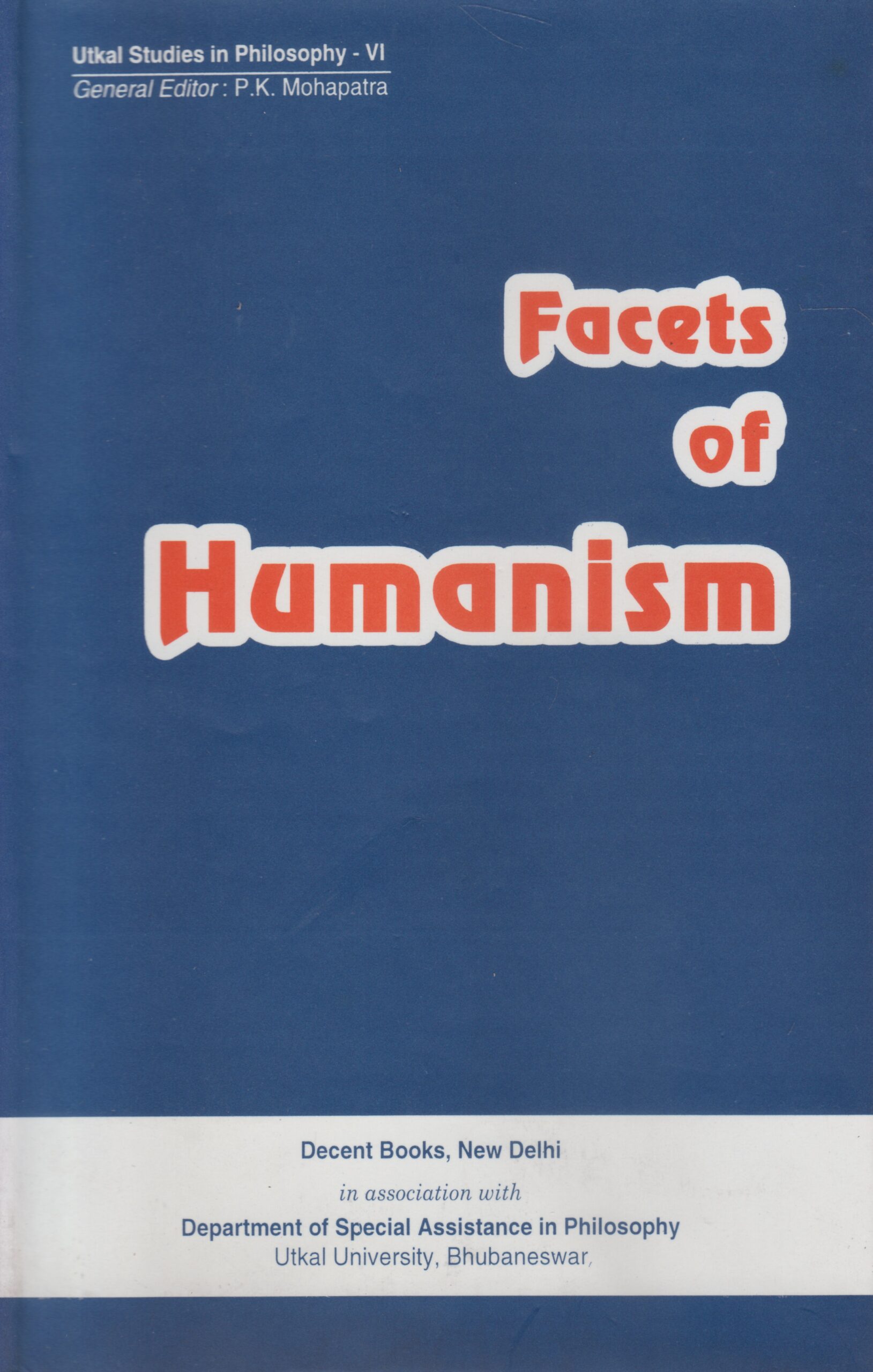
This book focuses on the proper analysis and understanding of humanism and its implications on, and applicability to, the present social scenario. It discusses suitable models of humanism for effective social structuring.
When the humanistic world view had its beginning in Protagorass declaration that man is the measure of things, it was very soon condemned as a subjective, individualistic doctrine without being understood. Yet, since the importance of humanism in the making of a meaningful, value-based society can never be overlooked, humanistic ideals kept trickling in over the years in both Western and Indian philosophical speculations; and it came to be increasingly realised that nothing unhuman can be of interest to man and nothing human can be alien to human thinking. However, humanism now-a-days has become somewhat of a cliche, so much so that almost everybody engaged in some sort of intellectual exercise claims to be a humanist. What is required, therefore, is proper analysis and understanding of humanism and its implications on, and applicability to, the present social scenario. With this objective, this book has focussed on the various aspects of humanism and the authors have attempted to carve out suitable models thereof for effective social structuring and nation building. Readers will benefit by the indepth analyses of the concept in its multifarious dimensions and its application to various aspects of intellectual discourse. Facets of Humanism will be of immense use to students and researchers in philosophy and the social sciences.
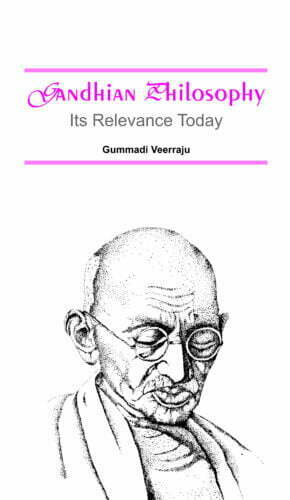
Retrieving a range of Gandhis social, economic, moral, spiritual, cultural and political ideas from various sources, this work gauges the relevance of Gandhi and Gandhism in the dehumanized, fragmented world of moral decay and unbridled consumerism.
Gandhi (1869-1948) held no political office. Yet he could arouse the conscience of an entire subcontinent! A lean, frail, half-naked fakir armed with a wooden staff and simple dignity of a human being, he fought against the greatest empire, the world has known. It was just the moral grandeur of his soul which enabled him to fight against brute power, in any form, even vanquish it. Generations to come will scarce believe that such a one as this in flesh and blood walked upon this earth, said Professor Einstein of him. A saint, social activist and political philosopher, unlike any other known in the twentieth century, Mohandas Karamchand Gandhi held out a message which, based on a series of his experiments with truth, touched upon every domain of human life: social, economic, moral/spiritual, cultural, political. Retrieving a range of these ideas from a variety of sources, this book tries afresh to gauge how far Gandhi and Gandhism are relevant in this dehumanized, fragmented world, perched dangerously on stockpiles of all-devastating arsenal; or in this age of distrust, moral decay and unbridled consumerism; or yet again when seen against todays aggressive/retaliatory attitudes, or against the growing cult of violence. The book is not just a revalidation of Gandhian philosophy, but a reminder as well, suggesting how in his abiding solutions alone: with their eloquent underpinnings of truth, non-violence and service of humanity, lies the hope for mankind in this conflict-ridden world.
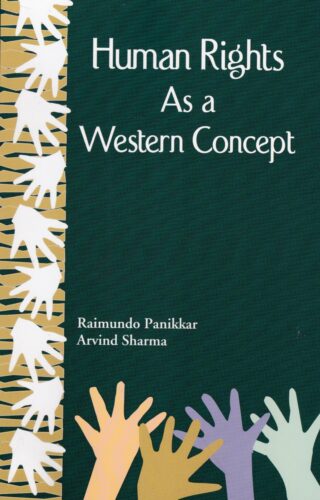
Whether the discourse on Human Rights constitutes an authentically universal discourse, or merely Western discourse masquerading as such, is an issue which has persisted ever since the Universal Declaration of Human Rights was adopted in 1948, and shows no signs of letting up. This book presents an in-depth exploration of this issue in a novel format, by presenting a celebrated piece on this issue by Raimundo Panikkar, with a detailed response to it by Arvind Sharma, thereby laying bare several key dimensions of the debate which may otherwise escape notice.
Whether the discourse on Human Rights constitutes an authentically universal discourse, or merely Western discourse masquerading as such, is an issue which has persisted ever since the Universal Declaration of Human Rights was adopted in 1948, and shows no signs of letting up. This book presents an in-depth exploration of this issue in a novel format, by presenting a celebrated piece on this issue by Raimundo Panikkar, with a detailed response to it by Arvind Sharma, thereby laying bare several key dimensions of the debate which may otherwise escape notice.
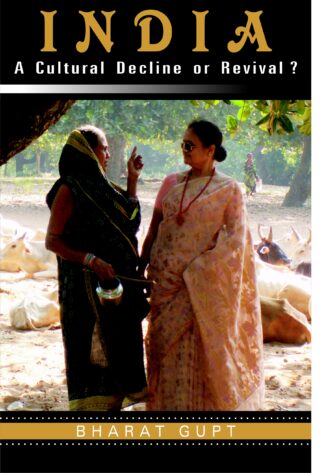
This book critically analyses the state of affairs in India after the British left in 1947 and examines whether Independence has ushered an era of cultural and social freedom or a cultural decline has set in a thought-provoking subject.
It is often taken for granted that Independence from the British rule also ushered an era of cultural and social freedom in India. The author wishes to examine if that is true or if a cultural decline set in soon after. Based on a verse in the Pancatantra, the book has been divided into six parts: Eka (person), Kula (family), Grama (habitat), Janapada (land), Prithvi (earth) and Atma. Issues of education; conflicts between the classes, regions, jatis, languages and religions; expansion of proselytizers; lack of governance; tensions between the legislators and judiciary; rise of unbridled consumerism; falling standards of democracy; dilemmas created by notions of dharma challenged by Westernized modernity; and the problems of attaining universal harmony, are all put into a perspective under these six categories. While examining the state of affairs the author also suggests a way for the pursuit of happiness through unselfish transcendence.

This book critically analyses the state of affairs in India after the British left in 1947 and examines whether Independence has ushered an era of cultural and social freedom or a cultural decline has set in a thought-provoking subject.
It is often taken for granted that Independence from the British rule also ushered an era of cultural and social freedom in India. The author wishes to examine if that is true or if a cultural decline set in soon after. Based on a verse in the Pancatantra, the book has been divided into six parts: Eka (person), Kula (family), Grama (habitat), Janapada (land), Prithvi (earth) and Atma. Issues of education; conflicts between the classes, regions, jatis, languages and religions; expansion of proselytizers; lack of governance; tensions between the legislators and judiciary; rise of unbridled consumerism; falling standards of democracy; dilemmas created by notions of dharma challenged by Westernized modernity; and the problems of attaining universal harmony, are all put into a perspective under these six categories. While examining the state of affairs the author also suggests a way for the pursuit of happiness through unselfish transcendence.
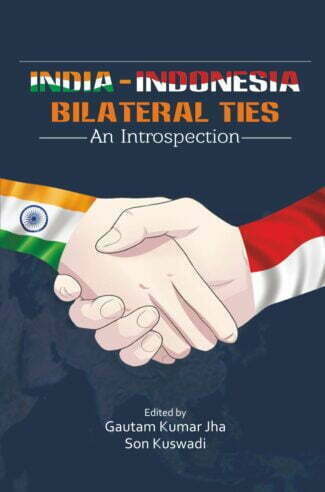
India and Indonesia maintained strong cultural and historical relationship for few millennia. As a testimony to it India stood firm for Indonesia’s freedom from the Dutch, inspiring its leaders. With India’s Look East Policy, the mutual relationships, especially in trade, have reached new heights. The economic reforms in both the countries demand stronger ties in the days to come.
India and Indonesia experienced close historical and civilizational relations from the ancient times to sixteenth century ce. During the Indonesian freedom struggle, its leaders were inspired by the anti-colonial views of Indian leaders. India firmly stood for the freedom of Indonesia from the Dutch.
During the post-colonial period, the bilateral relations underwent ups and downs. Indias Look East Policy of the 1990s made a phenomenal leap in both the countries relationship. India by leveraging its soft power, stable foreign policy, non-interference policy established trust among many South-East Asian countries and in particular Indonesia. Indonesia, being the largest country in the region, has been proved as one of the greatest allies of India.
After a decade of stable governance under President Susilo Bambang Yudhoyono, Indonesia now has a fairly strong democratic set-up. The country made the transition after thirty-one years of dictatorship of Soeharto, under the leadership of B.J. Habibie, Abdurrhaman Wahid and Megawati Soekarnoputri.
Now, when both the countries are poised to fly high after having witnessed considerable economic reforms, they need to forge stronger ties in order to further expand bilateral trade and strategic relations, being the main focus of this volume.
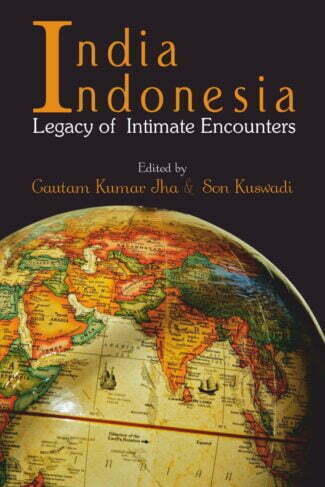
Evidences suggest that India and Indonesia were in trade relations for many millennia, starting from 3500 bce. Indonesia got all three religions Hinduism, Buddhism and Islam from India. There were ups and downs in their relations. This volume vividly talks about topics that foster(ed) mutual relations such as culture, religion, language, traditions and education.
Evidences suggest that India and Indonesia were in trade relations for many millennia, starting from 3500 bce. Suvarnabhumi (Sumatra) is mentioned in Jatakas, Indian epics and Mahavamsa, though there is no sequential documentation of it. The trade relations paved the way for Bali importing Indian pottery, priests coming from India and getting absorbed into the Indonesian society and the Indian traders and priests marrying the locals and settling there, thus spreading Hinduism and Indian culture throughout Java, Bali and Sumatra. Indonesia thus got all three religions Hinduism, Buddhism and Islam from India.
The historical and civilizational relations continued till the sixteenth century ce. The Western colonization drive of Asian countries broke this long-stood relationship. Coming to the twentieth century, Indonesia and its leaders were highly inspired by the anti-colonial views of Indian leaders like Mahatma Gandhi, Jawaharlal Nehru, Vallabhbhai Patel and Rabindranath Tagore, and India extended her moral support to the freedom struggle of Indonesia. But during the post-colonial era, the bilateral relations between both the countries were incoherent. The Look East Policy of India in the 1990s rejuvenated the relations and Indonesia became one of the greatest allies in fulfilling Indias South-East Asia Policy.
The scholarly articles in this volume vividly talk about topics that foster(ed) mutual relations such as culture, religion, language, traditions, education and so on, keenly drawing the attention of policy makers, trade analysts, cultural enthusiasts, investors, among a wide range of audience.

The book relates the diverse experiences of Mr. Tzannis Tzannetakis, a former Greek Prime Minister, in India: he witnesses centuries-old marvels, landmarks of its long religious-cultural tradition; and his response is profound and genuine.
A journey to India . . . is quite unlike a journey to any other land . . . this sentiment expresses the uniqueness of a visitors experience of India. For, among other things, India is a perpetual mystery to him from the beginning; he wades through the mystique and out of it; and he is never free of it. For Mr. Tzannis Tzannetakis, a former Prime Minister of Greece, India is this and much more. His informal experiences presented here are diverse and steeped in the historic-cultural flavour special to India. He sees its centuries-old palaces, forts of ancient maharajas, of the glorious Mughals; the unparalleled cave monuments of Ajanta-Ellora with their exquisite carvings, the breathtaking sculptural decorations and the architectural dream of Khajuraho; the grandeur of the Taj, a wonder in white marble; the exotic deserts of Jaisalmer; the heart of holy India, Banaras, with the ever-flowing Ganga; the marvel of Delhi which amalgamates the old and the new. His response is, likewise, rich with a range of tones; he not only admires the material landmarks of ancient India but breathes in the spirit of the past the old delight, the royal romance, the dignity, valour in that chivalry . . . His is not simply a discovery of India but an analysis of Indias time-tested values and its modern message in order to understand India in the real sense its unique past; the India of today, of the traditional and the modern; and the India of the future . . . its goals, aspirations. The authors tone is wonder-struck but, at the same time, genuine and realistic. He captures the essential India and not just its forms and colours to present a delightful, critical and sensitive picture.
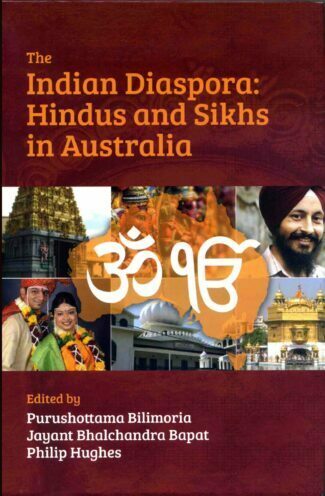
This book covers the theory of diaspora, the historical development of the Indian communities in Australia since the late 19th century to the present times, current practices and statistical profiles of Hindus and Sikhs in Australia, and interactions between Hindus and Sikhs with the wider Australian community.
Since the late 1990s, the Indian community in Australia has grown faster than any other immigrant community. The Indian Diaspora has made substantial contributions to the multi-ethnic and multi-religious diversity within Australia. The growth of Hinduism and Sikhism through gurus, temples, yoga and rituals of many kind has brought new colours, images, customs and practices to the profile of Australian religion, and the Australian landscape more widely. At the same time, Hinduism and Sikhism have themselves been transformed as Hindus and Sikhs from different parts of India as well as Fiji, Malaysia and other parts of the world have come together to establish a pan-Indian ethos. Hindus and Sikhs here have also interacted with other sectors of the Australian population and with religions from the Western world. This is the theme of this book.
The Indian Diaspora covers the theory of diaspora, the historical development of the Indian communities in Australia since the late 19th century to the present times, current practices and statistical profiles of Hindus and Sikhs in Australia, and interactions between Hindus and Sikhs with the wider Australian community. There are case-studies of the Indian students and women in the Australian community, of Indian communities in Melbourne and South Australia, and of temple building and the Sikh gurdwara.
The book has been edited by and contains contributions from Purushottama Bilimoria, an internationally-known scholar of philosophy and religion, Jayant Bhalchandra Bapat, one of Australias most senior Hindu priests and a scholar of Hinduism, and Philip Hughes, a leading analyst of the religious profiles of the Australian people. It also contains contributions from several other prominent scholars. Included are special essays on the importance of diaspora by the late Ninian Smart and on the 19th century Afghan cameleers and Indian hawkers.
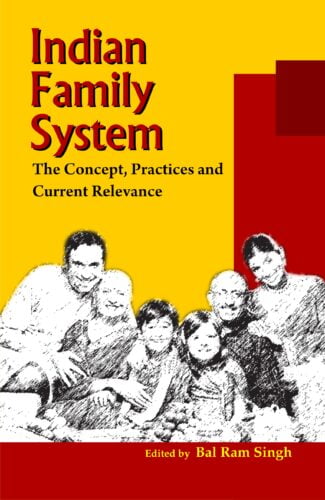
The book examines the joint family system in India — its roots in Vedic times, its evolution and relevance and practicality in the present times, the changing social norms, value systems and human behaviour over time, the position and status of the aged with the decline of the system, etc.
The joint family system has ancient roots in India, being traceable to the Vedic times when four generations lived together. The tradition helped in maintaining strong bonds of kinship and keeping alive customs and traditions of the past. This book seeks to examine the joint family system in India: its evolution and relevance and practicality in the present times. It deals with the changing social norms, value systems and human behaviour over time and views the role of religion in promoting human values and fellowship which are an essential ingredient of joint family norms. With case studies, it explores aspects of the Indian family like its cultural and ritualistic traditions, the importance and role of the woman as the backbone of the Vedic society, the position and status of the aged with the decline of the joint family system, and the importance of the joint family as a vehicle for accumulating wealth — both material and in terms of serving and benefiting all. The volume will prove a useful contribution for scholars and students in the field of Indian social and cultural studies.
| There are no products |